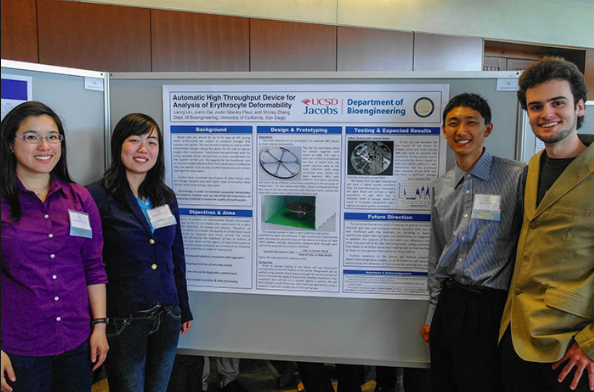A capstone design course sequence is required for senior level students in the Bioengineering, Bioengineering: Biotechnology, Bioengineering: Bioinformatics, and Bioengineering: Biosystems majors. The capstone design course sequence consists of a multi-quarter upper-division sequence of courses that totals ten quarter-units and includes (1) a series of four one-unit courses on selection (BENG 187A), design (BENG 187B), implementation (BENG 187C), and presentation (BENG 187D) of design projects, with consideration of professional issues, and (2) a sequence of two three-unit design (BENG 188A/B) project courses. Design project topics span a wide variety of bioengineering areas, including biomechanics, systems bioengineering, nanoscale and molecular bioengineering, bioinformatics, tissue engineering and regenerative medicine, and bioinstrumentation. The design projects and presentations will be performed by student teams in the course sequence.
Projects
To submit a project, please visit: UC San Diego Department of Bioengineering | Senior Design
A Senior Design Project is now required for all of our undergraduates.
Examples of previous projects can be found at https://beseniordesign.ucsd.edu/design-projects and include:
- Instrumentation for animal heart rate & blood pressure
- Microfluidic platform for single cell fluorescence measurements
- Neural plasticity following tendon transfer surgery
- Bioreactor bioengineering for cartilage and joints.

Projects involving a corporate Sponsor or Client and a UCSD Bioengineering Faculty Member
Thank you for considering partnering with the UC San Diego Department of Bioengineering and our undergraduate students to be a Sponsor of a Senior Design Team. Please contact Dr. Alyssa Taylor, atayloramos@ucsd.edu for details on establishing a partnership.
Expectations for Sponsor or Client
- Develop the project with the Course Coordinators
- Provide information for an overview of the project to prospective students (Spring)
- Meet with the design team, 1hour/week for two 10-week quarters (Fall and Winter)
- It is often appropriate for the primary contact to be a PhD student, a Post-Doc, or a Staff member. Please communicate to the students and Dr. Taylor.
- Attend the final presentation event (Spring)
- Additional support and other costs associated with project (supplies, materials)
The Bioengineering Department supports a modest budget for each project. For many projects the amount covers the project expendables; for more expensive projects the amount is a solid contribution to the mentor’s support.
